
1
A Guide to the First Year
in the B.S.E. Program
Fall 2022

2
Note: This guide is not a substitute for face-to-face advising. Students should meet with their
academic advisor AS OFTEN AS NECESSARY to discuss their goals, concerns, coursework, and progress
in the B.S.E. program.
You are required to meet with your adviser at the start of the fall term and when choosing courses for
the spring term, and you are strongly encouraged to meet with your adviser at the start of the spring
term to assess your experience in the fall term and discuss your possible choices of majors.
Instead, this handbook complements the advice from your adviser and other members of your advising
team to provide context and to fill in gaps, as well as to provide useful tips for academic success.
Disclaimer: In the event of unintentional discrepancy, the information in this handbook is superseded
by Princeton University documents-of-record such as the Undergraduate Announcement and by the
official guides and webpages of the six engineering departments.
Please send all suggestions for improving this handbook to the SEAS Undergraduate Affairs Office,
BSEprogram@princeton.edu
.
3
Contents
1. Engineering at Princeton ....................................................................................................................... 5
What is Engineering? ................................................................................................................................ 5
Studying Engineering at Princeton ............................................................................................................ 5
How the B.S.E. Program is Structured....................................................................................................... 5
What do B.S.E. Students Do Over the Summers? ..................................................................................... 6
What do B.S.E. Students Do After Graduation? ........................................................................................ 6
2. Basic Information to Get Started .......................................................................................................... 7
Important Terms and Abbreviations ......................................................................................................... 7
Communication ......................................................................................................................................... 7
Accreditation and Licensure ..................................................................................................................... 9
The Unknown Unknowns (or, Questions You Should Ask in the First Year) ........................................... 10
3. B.S.E. First-Year Advising ......................................................................................................................... 11
Who is My Faculty Adviser? .................................................................................................................... 11
Role of the Adviser .................................................................................................................................. 11
What to Expect from Your Adviser ......................................................................................................... 11
Advising Meetings ................................................................................................................................... 12
Preparing for Meeting with Your Adviser ............................................................................................... 12
Engineering Interactors ........................................................................................................................... 12
Other Sources of Authoritative Advice ................................................................................................... 13
4. Choosing Fall Term Courses ................................................................................................................ 14
Procedures .............................................................................................................................................. 14
Advanced Placement .............................................................................................................................. 14
Program of Study .................................................................................................................................... 15
The First Two Weeks of Classes .............................................................................................................. 21
Advanced Standing ................................................................................................................................. 21
5. Succeeding in Your Courses ................................................................................................................ 22
What to Expect in Your Classes ............................................................................................................... 22
Outside the Classroom ............................................................................................................................ 22
Academic Support and Tutoring ............................................................................................................. 25
4
Academic Integrity .................................................................................................................................. 25
6. Choosing Courses for Spring Term ...................................................................................................... 26
Courseload .............................................................................................................................................. 26
Math ........................................................................................................................................................ 26
Physics ..................................................................................................................................................... 26
Chemistry ................................................................................................................................................ 26
Computer Science ................................................................................................................................... 26
Writing Seminar ...................................................................................................................................... 27
Humanities and Social Sciences .............................................................................................................. 27
Other Considerations .............................................................................................................................. 27
Starting to Think about a Major .............................................................................................................. 27
Summer Courses ..................................................................................................................................... 27
7. Choosing a Major ................................................................................................................................ 28
Sources of Information ........................................................................................................................... 28
Major Maps ............................................................................................................................................. 29
Certificate programs and interdisciplinary work .................................................................................... 33
Changing majors ..................................................................................................................................... 33
Planning for Studying Abroad ................................................................................................................. 33
8. Useful Contacts ................................................................................................................................... 34
SEAS Directors of Undergraduate Studies .............................................................................................. 34
Certificate Program Directors ................................................................................................................. 34
Other Important Offices and People ...................................................................................................... 36
9. How do I …?......................................................................................................................................... 38
5
1. Engineering at Princeton
Now that you have arrived at Princeton as a candidate for the B.S.E. degree, or have transferred into the
B.S.E. program in your first year, it might be helpful to know what you have signed up to study.
What is Engineering?
There are many definitions of “engineering” but the broadest is that engineering seeks to apply the
principles of math, science, and other relevant disciplines to the solution of the challenges that face
humanity. These solutions may take the form of structures, machines, processes, or networks, or they
could also be computer applications or the optimization of complex systems. “Design” is a word that
separates engineering from the sciences: engineers design things using the tools of math and science,
within the methods that define each engineering discipline.
Studying Engineering at Princeton
At Princeton, the Bachelor of Science in Engineering degree offers a rigorous education in the principles
of engineering science and math combined with a strong component of the liberal arts. The B.S.E.
degree is offered in six departments: Chemical and Biological Engineering (CBE), Civil and Environmental
Engineering (CEE), Computer Science (COS), Electrical and Computer Engineering (ECE), Mechanical and
Aerospace Engineering (MAE), and Operations Research and Financial Engineering (ORFE). The
Computer Science department also offers the A.B. degree. Every student has a single major, but they
are also able to pursue one or more certificate programs, not necessarily connected with engineering.
How the B.S.E. Program is Structured
It is true that the B.S.E. program has more sequential structure and prescribed courses than the A.B.
degree program. This does not mean that it is inflexible, however. Although there are required first-
year courses and departmental core courses, there is considerable room for electives within your major
and outside of engineering requirements. Although each student experiences the program of study in
different ways, the four years follow a clear pattern to provide a vertically-integrated academic
experience. B.S.E. students are able to take more than the minimum of humanities and social science
courses, pursue certificate programs, and study abroad.
The First Year
The first year of the B.S.E. program is common to all six engineering departments. It consists of two
terms of physics, two terms of math, a term of chemistry (or two, if interested in CBE), a term of
computer science, a writing seminar, and humanities and social science electives. During their first
year, B.S.E. students take advantage of opportunities to learn about the different departments so that
they can make an informed choice of major at the end of the spring term.
Sophomore Year
In the sophomore year, students take the foundational courses in their chosen department (usually one
or two per semester) that teach the principles of engineering science, as well as finishing any remaining
math requirements, and taking more humanities and social science electives. Sophomore year is a good
6
time to think about special tracks in your department, certificate programs, studying abroad, and other
academic opportunities in the junior and senior year.
Junior Year
During the junior year, students take departmental courses, both core requirements and electives. In
most B.S.E. majors, there is a course in design and opportunities for junior independent work. Students
also continue taking humanities and social science electives or pursue certificate programs. Study
Abroad opportunities are available in all engineering disciplines, although departmental requirements
may dictate in which semester it is possible to go away.
Senior Year
In senior year, B.S.E. students take advanced departmental courses and do independent work.
Depending on your department, independent work may take the form of a one-semester exercise but
most commonly it is done as a two-semester thesis or project. You will carry out whatever research,
design, fabrication, prototyping, simulations, statistical analyses, programming, or modeling is necessary
to address your topic and contribute to knowledge. You should also take advantage of your final
opportunity to take humanities and social science courses at Princeton.
What do B.S.E. Students Do Over the Summers?
Summers are the time to obtain experience and to earn some money. Ideally you will learn something
about your interests and about yourself. Do not feel that your summers all have to be devoted to
engineering in some form. Many students pursue multiple activities, including research, employment
in industry, summer courses, and travel (not at the same time, of course). After the first year, you may
find that companies are not yet eager to hire you, although you should explore possibilities nonetheless.
After sophomore year, they start getting more interested, and after junior year, they will be much more
interested, for they hope that you will consider working for them after graduation. If you are attracted
to research, obtaining some experience is important. You also need time to relax and recharge, so make
sure you include that in your summer plans.
What do B.S.E. Students Do After Graduation?
B.S.E. grads head in many directions. About 20% like what they see their professors do, engineering as
a research science, which involves going to graduate school and getting a Ph.D. Another large group
will practice engineering by going to work for a company that makes a product or provides a service.
Others use their engineering education as a basis for careers in finance and consulting. Grads pursue
many other paths. Some start a company. Others play professional sports. Theater, music, and film-
making have all been career paths. Medical school and law school attract some B.S.E. students, as well
as military service. Princeton engineering graduates have even become priests, ministers, and rabbis.
7
2. Basic Information to Get Started
Important Terms and Abbreviations
SEAS School of Engineering and Applied Science, founded in 1921, comprised of six
departments, pronounced “seas”
B.S.E. Bachelor of Science in Engineering degree
A.B. Bachelor of Arts degree
CBE Department of Chemical and Biological Engineering
CEE Department of Civil and Environmental Engineering
COS or CS Department of Computer Science, pronounced “kos”
ECE Department of Electrical and Computer Engineering (formerly ELE or EE)
MAE Department of Mechanical and Aerospace Engineering
ORFE or ORF Department of Operations Research and Financial Engineering, pronounced “orf-ee”
ChemE Chemical Engineering, old name of CBE, although still sometimes used conversationally
E-Quad The Engineering Quadrangle (1962), home to CEE, CBE, ECE, MAE, Keller Center, and
deans
CS Building The Computer Science Building (1989), home to Computer Science, of course
Friend The Friend Center for Engineering Education (2001)
Sherrerd Sherrerd Hall (2008), home of ORFE and the Center for Information Technology Policy
ACEE Andlinger Center for Energy and the Environment (2015), corner of Olden and Prospect
ABET ABET, Inc., accreditors of engineering programs of study (see below; pronounced “A-
bet”)
FC Friend Center room number prefix (e.g. FC 113, also known as the Convocation Room)
A-B-C-D-E-F When it appears before a room number, the letter refers to the wing of the E-Quad; in
general, the letters map to departments as follows: A – CBE; B – ECE; C – Dean’s Office,
and other shared facilities; D – MAE; E – CEE; the new Robotics Lab is the F-wing; you
will discover where the G and H Wings are in the fullness of time.)
Communication
E-mail is the standard form of communication to and from University offices. It is your responsibility to
check your Princeton e-mail daily and respond to messages that request a response. Don’t expect an
8
instantaneous response from professors, since they have many competing demands on their time, but
they should respond at the earliest possible moment. If you do not hear back within a reasonable
period of time, say 48-72 hours, you should feel free to send a polite follow-up e-mail. Please note
that most faculty and staff do not check e-mail on weekends and holidays as often as on workdays.
A few hints:
• Always include a subject line that says what you are writing about. “Advice needed” is not
helpful, but “Advice needed about Physics 103” says that it is important and probably
urgent.
• E-mail etiquette makes a good impression. Err on the side of formality in address. Most
faculty members hold the title of Professor, and even if they don’t have that title officially,
there is nothing wrong with using it anyway. You can’t go wrong with “Dear Professor (last
name)” or “Dear Dean (last name)” to start an e-mail. If it feels right, you can say “Hello,
Professor” or even “Hi, Professor”.
• Never write “Hey, Professor” or just “Hey” to start a message. For some reason, “Hi”
doesn’t annoy faculty members and deans the way that “Hey” does.
• Don’t use first names to address faculty unless given a clear signal that it is OK, even if that
was permissible at your high school.
• Keep e-mail short and direct. Any message longer than five sentences or so is really
something you should be discussing in person. If the recipient needs more information,
that can be supplied in a follow-up message.
• Write in full sentences, with proper punctuation and capitalization, without text-message
abbreviations.
The telephone is still a useful means of communication, and some faculty members prefer it to e-mail.
Always leave a voice mail with your name, phone number, and/or e-mail. Don’t just hang up!
You can find the e-mail of faculty members and deans by searching their name on the Princeton
University website by clicking on the search icon in the upper right of the homepage.
Faculty members and deans generally do not live in the world of Instagram, Snapchat, Discord or other
social media unless they let you know otherwise.
The SEAS Undergraduate Affairs Office routinely broadcasts e-mail with important information and
upcoming events. Please do not discard this e-mail without first taking at least a cursory look at it, and
in most cases reading it. It is always relevant to some portion of the student population. Please do not
try to send a message to these lists yourself since you will just get an error message. Dean Bogucki is
open to requests to forward information on behalf of student activities and organizations, and he will
broadcast an e-mail with the policies on this early in the fall term.

9
Accreditation and Licensure
Engineering programs of study are accredited by the Engineering Accreditation Commission of ABET,
https://www.abet.org
. Engineering programs of study are the criteria under which the curriculum,
faculty, and other elements of instruction are evaluated, and may not match the titles of Princeton
departments. Accredited programs of study are offered in the following areas:
• Civil Engineering: programs of study offered by the Department of Civil and Environmental
Engineering except for the Engineering and Liberal Arts track and the “architecture focus”
option under the Architecture and Engineering track; if in doubt, consult the director of
undergraduate studies;
• Chemical Engineering: the full undergraduate program of the Department of Chemical and
Biological Engineering;
• Electrical Engineering: the full undergraduate program of the Department of Electrical and
Computer Engineering;
• Aerospace Engineering: offered by the Department of Mechanical and Aerospace Engineering;
• Mechanical Engineering: offered by the Department of Mechanical and Aerospace Engineering.
The Department of Computer Science, as is the case with Computer Science departments at many of our
peer institutions, chooses not to pursue ABET accreditation. ABET accreditation criteria do not exist for
Operations Research and Financial Engineering as it is offered at Princeton. Degrees from both these
departments are of course accredited under the University’s overall accreditation by the Middle States
Commission on Higher Education.
Depending on the career they pursue, some B.S.E. graduates eventually seek professional licensure
granted by state (U.S.), provincial (Canada), or national (rest of world) boards. After taking a series of
exams and working for several years, licensed engineers are awarded the title of P.E. (“professional
engineer”) which certifies their competency in engineering practice. Professional licensure is mainly
relevant to graduates of Civil and Environmental Engineering, although graduates from CBE, MAE, and
ECE will occasionally seek it as well. At this early stage in your undergraduate career, licensure should
not be a major concern except to know that this process exists and that graduation from an ABET-
accredited program is necessary.

10
The Unknown Unknowns (or, Questions You Should Ask in the First Year)
Some B.S.E. students have told us that they wish they had asked more questions earlier in their first
year. One said, “We don’t know what we don’t know.” In order to try to address this, here are some
questions that you should think about and discuss with your advisers, friends, assistant deans in the
colleges, and other helpful people.
• What appeals to me about studying engineering?
• What does majoring in engineering involve?
• How is engineering different from the sciences?
• What sort of engineering do I want to pursue as an undergraduate major?
• What kinds of courses do I take after the first year?
• How do I find out more so I can choose a department wisely?
• What else would I like to study at Princeton?
• Am I eligible for Advanced Standing? Should I be interested in it?
• Are there certificate programs that might interest me?
• Can I play a sport and be an engineering student? (Yes!)
• Do I want to study abroad? Where?
• Am I interested in medicine as a career? In law? In music?
• What would I like to do next summer? Where?
• How do I make connections with other engineering students?
• How can I get involved with engineering student organizations?
• What do engineering students do after they graduate?
This is not an exhaustive list of the questions that should be on your mind, but it is a start. You will find
that the information in this handbook will be helpful in framing answers to them, but they will also
require reflection and consultation on your part.
11
3. B.S.E. First-Year Advising
Central to the academic experience of B.S.E. first-year students is your faculty adviser. This section will
explain how advising works during the time between when you begin the fall semester and when you
choose an engineering department in the second half of the spring semester.
Who is My Faculty Adviser?
Your adviser is a member of the faculty in one of the six engineering departments. Faculty members
teach several courses a year, advise independent work and senior theses, and do cutting-edge research
in a field of engineering. Your adviser is a fellow of your residential college. Based on information
you have provided, we try to assign you to an adviser with similar interests, although this is not always
possible. Since the B.S.E. first-year program of study is common to all six engineering departments,
whether or not your adviser is in the department in which you eventually intend to concentrate should
not be a problem. You are always welcome to seek specific departmental advice from the director of
undergraduate studies and other faculty members in areas that interest you.
After spring break, you will part ways with your first-year adviser and meet with an adviser in the
department in which you choose to major. Information about this process will be sent immediately
after spring break.
Role of the Adviser
The primary role of the B.S.E. faculty adviser is to advise you on your choice of courses during the first
two semesters and to help you think about your academic goals and direction. Consider your adviser
to be your guide in getting off to a good start in the B.S.E. program. We hope that you develop a
cordial working relationship with your adviser and feel comfortable asking candid questions about your
program of study and how to succeed in your academic pursuits.
A few notes of caution, however: You are ultimately responsible for making choices about courses,
based on degree requirements and your preparation. Although B.S.E. advisers have considerable
experience, they do not possess encyclopedic knowledge of the entire Princeton curriculum. For that
reason, you should seek additional advice from other knowledgeable sources if you find that you have
reached the limit of what your adviser can tell you.
What to Expect from Your Adviser
The advising relationship is a collaborative effort between you and your adviser. In order to accomplish
this, you can expect the following from your adviser:
• A wise perspective on programs of study and long-term plans;
• Respect for different levels of academic preparation and interest;
• Knowledge of B.S.E. first-year curriculum and requirements; working knowledge of
placement criteria; knowledge of other sources of authoritative information;
• Availability during regular posted office hours, additional office hours during key

12
enrollment periods, and timely e-mail response to questions;
• Familiarity with the academic support services and resources on campus and
knowledge of where to direct an advisee for more information;
• Willingness to be asked for a letter of recommendation for a summer job or research
opportunity and enough knowledge of the advisee to write a letter appropriately
reflecting an advising association;
• Maintenance of confidentiality about the advising relationship.
Your adviser should take a sincere personal interest in your academic goals and aspirations and should
listen to your concerns to refer you to other sources of advice and help. You should help your adviser
get to know you by staying in touch and coming prepared to meetings.
Advising Meetings
You are required to meet with your adviser at least twice, although we hope that you get together more
than that. Before classes start, you will meet with your adviser to select courses for the fall term.
During November-December, you will have another meeting with your adviser that is scheduled at your
mutual convenience to choose courses for the spring term. Outside these mandatory meetings, you
should feel free to contact your adviser whenever you have a question or concern. While advisers are
encouraged to reach out to their advisees, you should also take the initiative to contact your adviser.
It is generally best to send an e-mail with a clear subject line, and if you don’t receive a timely response,
you should write again to arrange a time to meet.
Preparing for Meeting with Your Adviser
If you are meeting with your adviser to discuss courses, please think about your program of study in
advance of your advising appointment and prepare a couple of tentative programs of study based on
the B.S.E. requirements and the various options you have for electives.
Your principal source of information on courses will be the webpage known as Course Offerings, which is
linked from TigerHub, at https://registrar.princeton.edu/course-offerings
. In TigerHub, you can
compose tentative programs of study using Course Planner. Several student-developed schedule-
building apps also exist, and your Interactor or Residential College Adviser can direct you to them.
Come prepared with a list of other questions that you have about your studies at Princeton. Your
adviser can answer them or may refer you to someone who can.
Engineering Interactors
Working with each B.S.E. faculty adviser are one or more juniors and seniors known as Interactors.
You will meet them during Orientation. The role of the Interactor is to provide an opportunity for first-
year students to meet B.S.E. juniors and seniors throughout the year and to provide a connection to the
community of students, staff, and faculty that make up the School of Engineering and Applied Science.
Interactors can provide their perspectives in the engineering experience and guidance on how to
manage challenging course loads, balance academics and extracurriculars, and find academic support.

13
Please regard your Interactors as a valuable resource as you think about your intended department.
Remember, that even if they are not majoring in the department you’re thinking about, they certainly
have friends who are and can direct you to them.
Interactors also arrange informal gatherings of your advising group, for example for pizza or ice cream.
Take advantage of these opportunities to meet fellow B.S.E. students and have fun at the same time.
Other Sources of Authoritative Advice
Many publications and websites list all the sources of advice that complement what you receive from
your faculty adviser and interactors. Many of these can be found on the websites of the residential
colleges. The Class of 2026 Academic Guide has an excellent catalog of advising resources along with
an outstanding Frequently Asked Questions format.
Key sources of additional advice for B.S.E. first-year students:
• Dean Bogucki is happy to answer questions to which your adviser might not know the answer.
Write to BSEprogr[email protected]u
and either he will respond or Ms. Traci Miller will arrange
at time to meet with him.
• The assistant dean in your residential college is knowledgeable about the B.S.E. curriculum as
well as a key resource for discussing general academic concerns and referring to academic
support;
• Peer Academic Advisers in your residential college have received training in the B.S.E. curriculum
or may even be B.S.E. students themselves. Some of the RCAs are also B.S.E. students.

14
4. Choosing Fall Term Courses
This section provides practical advice about the B.S.E. curriculum, placement, advising.
Procedures
After you have spent the summer thinking about your courses for the fall and reviewing online
information, you should prepare a couple of tentative programs of study for the fall based on the B.S.E.
requirements discussed below. During the weeks of August 8-25, you will have a Zoom meeting with
your adviser. Your adviser will provide dates and times from which you can select an appointment. The
outcome of that meeting is a schedule of courses in which you will start the fall term. On September 2,
you will log on to TigerHub, the Registrar’s enrollment system, and enter your course selections.
Classes begin on September 6.
During the first two weeks of class, you can make changes. Changes of section and time can be worked
out internally within the course. Changes of course (e.g. from Physics 105 to 103) require approval of
your adviser. The Math department requires that you check in with them as well so they can keep
track of how many students are enrolled in each course.
Advanced Placement
Your adviser will have the AP and IB scores that have been reported to Princeton. If your adviser does
not have them, then they haven’t been reported to Princeton, so you need to take steps to get them
reported electronically. We will accept your personal report of scores for choosing courses for the fall
term. Detailed instructions on how to do this is in Path to Princeton at
https://path.princeton.edu/faq/learning
. Students with British A-level scores must bring their
documentation to their residential college office to ask that it be recorded.
Note that if you took Chemistry or Physics exams in 2020 or later (as in most cases), took other exams,
or took a college course, you must take one of the departmental placement exams offered if you want
to try to place out of these subjects. See Path to Princeton for the schedule. Your adviser will have
the results of these placement tests.
Advanced placement is awarded by Princeton departments based on their own criteria. Criteria for AP
are summarized in the document at https://odoc.princeton.edu/advancedplacement
. If you have
taken college-level courses in chemistry and physics, then you must take placement tests to place out of
B.S.E. requirements. Math preparation beyond BC Calculus (e.g. previous study of multivariable
calculus) must be discussed with the Math Placement Officer, who will provide written documentation
of placement beyond the 100-level. The maximum number of terms of AP credit awarded in any
subject is two.

15
Program of Study
The first-year year program of study is common to all six B.S.E. concentrations. It consists of two terms
of physics (103-104, 105-106, or EGR 151-153), two terms of math (103-104 (or EGR 152), 104-201, 201-
202, or equivalent), one term of chemistry (201 or 207), and one term of computing (COS 126 or ECE
115). Students with AP credit in physics, math, and chemistry can use it to place out of some of these
requirements (again, 2020 and later test results and other qualifications are subject to confirmation by
departmental placement tests.) See Figure 1 for a “standard” first-year program.
B.S.E. students normally take physics, math, and chemistry in the fall along with an elective course or a
writing seminar, while in the spring they take physics, math, and computer science along with two
elective courses or their writing seminar and an elective. Students who need a second semester of
chemistry because they are headed to CBE or are premed will have to replace one of their electives with
Chem 202 or possibly put off computing to sophomore year.
Why do students in ORFE and COS have to take physics and chemistry? First, it’s the Bachelor of
Science in Engineering degree. Second, the discipline of thinking systematically about complex
unstructured problems is directly transferable to other analytical disciplines, even if the subject matter
isn’t a prerequisite.
B.S.E. math, science, and computing requirements may not be taken on a Pass-D-Fail basis.
Physics
The B.S.E. general physics requirement of two terms of general physics is satisfied either through AP in
physics or by taking a two-term sequence of calculus-based first-year physics courses: Physics 103-104,
105-106, or EGR 151-153 (see Table 1 for a guide to options.) Most students take 103-104. There is no
partial AP in physics, so you need two units of AP to satisfy the requirement. Otherwise please plan to
take one of the two-term sequences along with most of the other B.S.E. first-year students. About half
the few B.S.E. students with AP in physics elect to forfeit the AP credit (and thus eligibility for Advanced
Standing) and take one of the two-term sequences anyway, while the other half use the AP credit to free
a space for a different course (and also to retain their eligibility for Advanced Standing). A handful of
students will take the ISC 231-234 sequence to fulfill the general physics requirement. While this is
acceptable, please be aware that these courses are very intense. If you have AP credit (e.g. in
chemistry), consider whether satisfying the general B.S.E. requirement with it will provide greater
curricular flexibility, particularly in the humanities and social sciences.
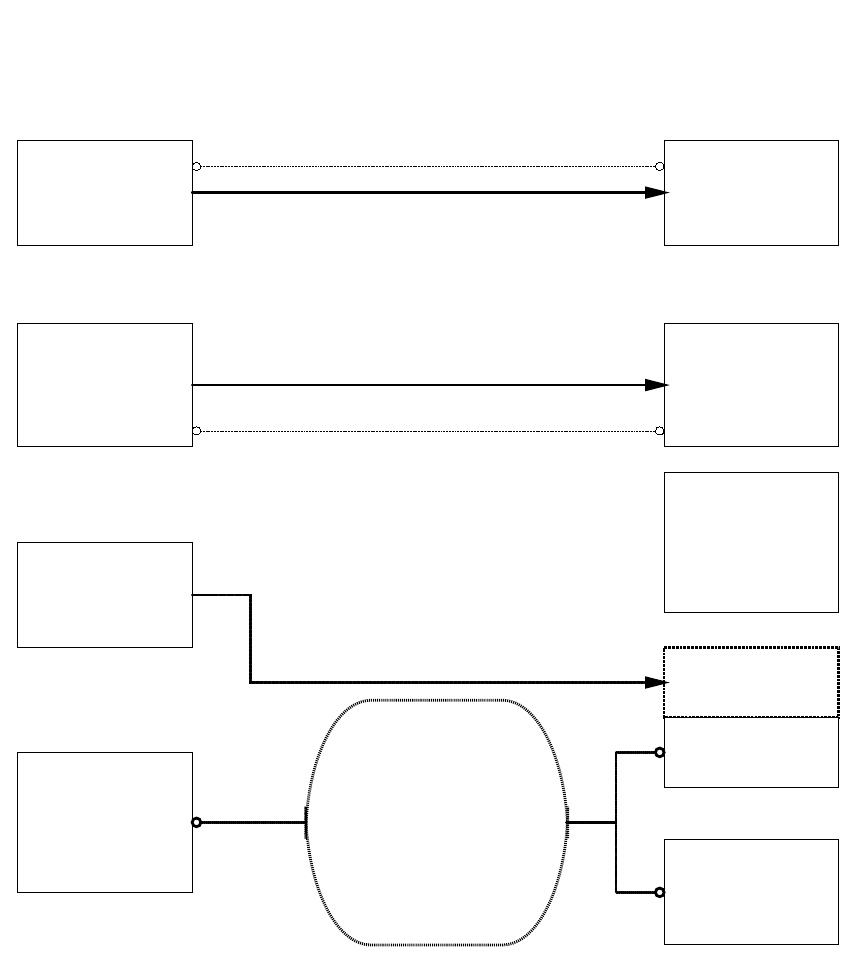
16
Physics
103/5
Physics
104/6
Math
103/104/
201
Math 104
201 or 203
202 or 204
Chem 207 (or
201)
Chem 202
for CBE majors
Elective/
Writing
COS126
Elective/
Writing
Elective
Fall
Spring
Student will
be assigned
to fulfill Writing
Requirement
in either Fall
or Spring
alternatively EGR 151 - EGR 153
alternatively EGR 152 - EGR 154
Figure 1. The "standard" B.S.E. First-Year Program

17
Courses
Placement
Comments
Physics 103, General Physics I, leads
to Physics 104 in spring
High-school physics, calculus
Calculus-based treatment of
mechanics taken by many generations
of B.S.E. students.
Physics 105, Advanced Physics
(Mechanics), leads to Physics 106 or
104 in spring
Strong high school physics and
calculus (many students in the
course have AP credit in physics)
More theoretical treatment of
material of Physics 103 suitable for
students with keen interest in physics,
either by majoring in physics or the
Engineering Physics certificate.
EGR 151, Foundations of
Engineering: Mechanics, Energy, and
Waves (taken in conjunction with
EGR 152, Foundations of
Engineering: Mathematics of Shape
and Motion). Leads to EGR 153 in
the spring.
High-school physics, calculus; open
to first-year B.SE. students only
WITHOUT AP credit in physics and
WITHOUT placement in
multivariable calc
A rigorous foundation in mechanics,
energy, waves, and thermodynamics
motivated by developing engineering
solutions to global challenges.
ISC 231-234, An Integrated,
Quantitative Introduction to the
Natural Sciences (231-232 in fall,
233-234 in spring)
Math placement into multivariable
calculus, very strong high school
science preparation
Mathematically and computationally
sophisticated introduction to physics,
chemistry, computing, and
biosciences in a year-long four course
sequence. Not motivated by
engineering, but completion of the
four-course sequence will satisfy the
B.S.E. general physics, chemistry, and
computing requirements.
Table 1. Guide to First-Term Physics Courses for B.S.E. students
Math
Math is crucial for engineering. The faster you complete the general B.S.E. requirements in math, the
more options you will have in sophomore and junior year among departmental courses. Thus you must
not skip math in the fall of your first year no matter how much AP credit you have. If you ask to defer
math, expect very strong opposition from your faculty adviser. All engineering students complete a
sequence of math courses through linear algebra, usually using a combination of AP credit and taking
courses at Princeton. See the Math department’s excellent page on placement at
https://www.math.princeton.edu/undergraduate/placement
and follow all the relevant links. See
Figure 2 for a schematic outline of math courses relevant to the B.S.E. degree.
Guidance on which math course to take will be provided by the Fall Math Placement Orientation
workshops (previously referred to as “MATH INFO”) on September 1. Based on this experience, you will

18
be able to make an informed decision whether to enroll in Math 103, 104, or 201 the following day.
Beforehand, however, you should think about which math course seems to be best given your
background.
If your preparation in calculus is minimal or did not involve taking an AP course, you should begin in
Math 103. That will be the longest route to completion of the math requirement, but it’s better to get
a good foundation rather than to push ahead. Many B.S.E. students who have taken a rigorous high
school calculus course like AB calculus will start in Math 104. If your preparation is adequate for 104, it’s
very much in your interests to start there. EGR 152 can replace Math 104 if you have the preparation
for Calc II.
If you took BC calculus and got a 5, the Math department now recommends Math 104 (in the past, a 5
would be a 201 placement.) You have to decide, with the benefit of the Fall Math Placement
Orientation workshops, whether you have mastered Calc II sufficiently to progress to 201 or if you
should take 104. Although it’s not an absolute benchmark, one indication might be whether you have
covered Taylor series. If not, then you might consider 104. See what you can determine from the
Math placement webpage linked above and from the Fall Math Placement Orientation workshops.
Do not take Math 175; it does not count for the B.S.E. math requirements, since it is mainly for
Economics majors and does not provide the foundation for subsequent engineering courses.
If you have taken a really thorough BC calculus course (or the equivalent A-level or IB-H exams) and
received a 5 (or an A-level A or an IB-H 7), you are potentially prepared to take Math 201 at Princeton.
201 is multivariable calculus. 203 is a more “mathematical” treatment of multivariable calculus,
involving proofs. Either one works fine for all B.S.E. majors. Note: EGR 156 is only open to B.S.E.
sophomores who have completed EGR 152-154 in the first year.
Some students report they have studied multi beyond variable calculus already in high school or have
taken a college course. Placement out of 201 requires written permission from the Math AP Officer, so
contact this discerning individual during course selection. If possible, provide examples of graded tests
and homework from your earlier coursework, as well as the syllabus and name of the textbook. If they
determine that you have covered multivariable calc at a comparable level of breadth, depth, and rigor to
the Princeton course, they will issue a written confirmation that you should take to your adviser. Same
goes for prior study of linear algebra. Otherwise, you need to take the course here.
Math 214 and 215 do not satisfy B.S.E. math requirements, since they are not multivariable calculus or
linear algebra. If you want to explore math as a possible major, we will not prevent you from taking one
of these courses, but you will still have to take multivariable calculus and linear algebra later.
Chemistry
The B.S.E. degree requires one term of general chemistry or its equivalent. It is satisfied with one or
two units of AP credit or by taking Chemistry 201 or 207. Chemistry 207 is the mainstream general
chemistry course for B.S.E. students, but there is no problem with taking 201 if that works better for
your schedule. If your intended program of study does not require further study of chemistry, and if
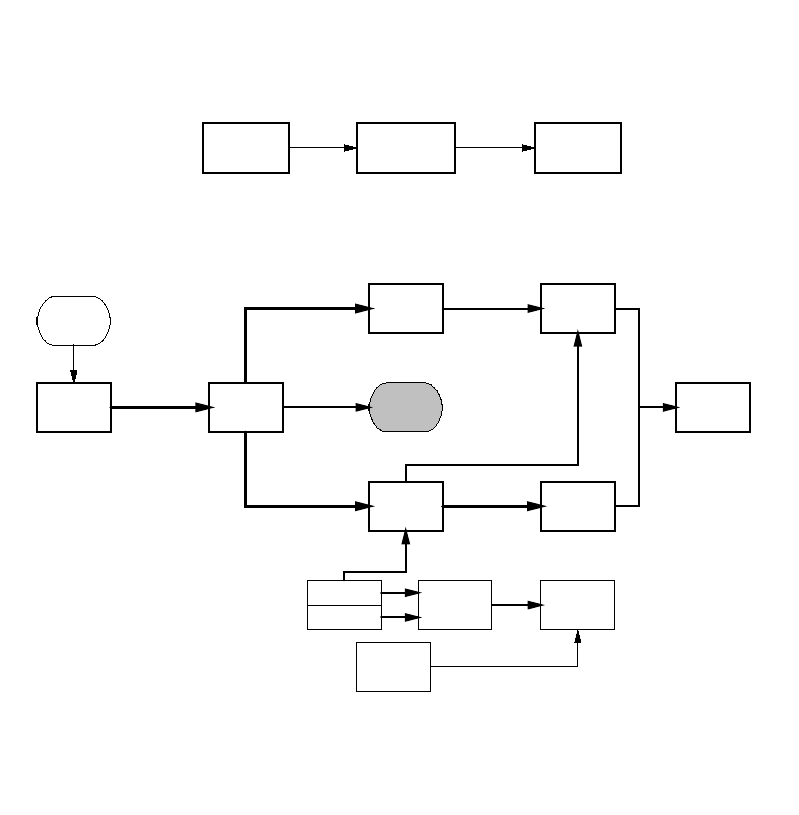
19
you have AP credit or have taken 201 or 207, then your chemistry requirement is complete. If you are
headed toward Chemical and Biological Engineering or if you are premed and take 201 or 207 in the fall,
you will also take Chem 202 in the spring. If you have 1 unit of AP credit in Chemistry and need more
chemistry for CBE or premed, then you should plan to take Chemistry 215, which is offered in the spring.
Math Placement Chart and Sequences for BSE students,
Fall 2022
216
EGR 152
(fall)
103
104
201
175
(NO!!)
203
217
202
204
218
214*
NO AP
1 UNIT AP
Mastery of
Calc I+Calc II
per MATH INFO
215*
X
SPECIAL
PERMISSION
MAE
305
VERY
SPECIAL
PERMISSION
EGR 154
(spring)
EGR 156
(soph fall)
100 (fall)
Figure 2. Math placement chart and sequences for B.S.E. students. B.S.E. students may not take Math
175. Math 214 and 215 do not fulfill B.S.E. requirements.
If you have a passionate interest in Computer Science and fully intend to major in that field, you may ask
your adviser to be allowed to defer Chemistry 201/207 until the fall of sophomore year and take
Computer Science 126 instead. Please understand that if you do this, you are complicating pathways
to other potential majors (especially MAE), so this option is really only for students who have a single-
minded focus on Computer Science as their only interest among the magnificent array of choices in
engineering.
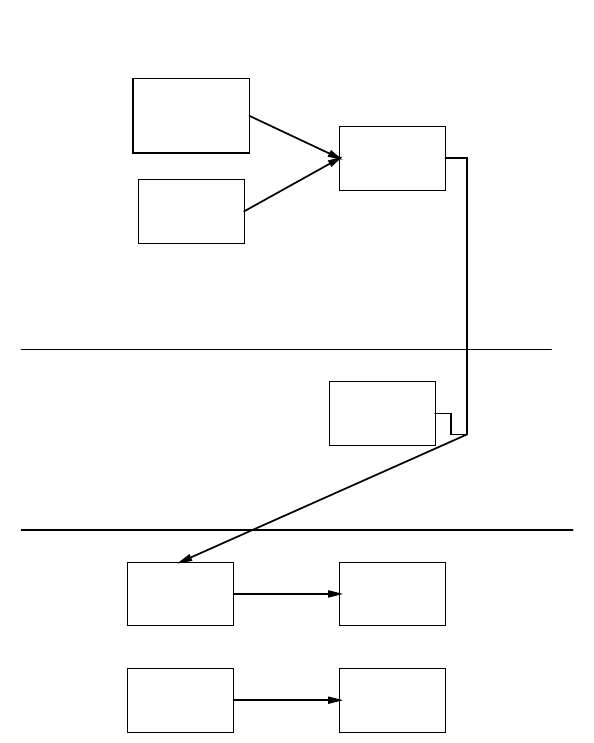
20
Beginning with the Class of 2026, Molecular Biology 214 will also be accepted for this requirement.
Please discuss with your adviser whether this is a viable option for your program of study. In CBE, if
you do not have AP in chemistry, you must take CHM 201 or 207 in the fall (you will take MOL 214 later
on.) CEE has expressed a strong preference for chemistry over biology for this requirement.
The Fourth Course
About half of the students in an entering class are assigned to take their writing seminar in the fall, and
the other half in the spring. If you are assigned to take it in the fall, then your fourth course will be
your writing seminar. If you are taking the writing seminar in the spring, then your fourth course in
the fall can be almost anything. Take something interesting that you have not had a chance to study
previously. Ideally, it will be in the humanities or social sciences, since another course that involves
problem sets and quantitative analysis will be too much in one way of thinking. It could also be a
freshman seminar. Humanities and social science courses at the 100- and 200-level work best. Some
300-level courses in the humanities and social sciences are open to first-year students with adequate
preparation. Courses at the 400-level and higher are not appropriate for fall term first-year students.
Chem 201
(general chem)
Chem 207
(adv.gen.chem
- materials)
(MSAT >680)
Chem 202
(general chem)
to sophomore year
0 AP
1 unit
AP
Chem 215
(adv.gen.chm
honors)
2 units
AP
CBE 245
Chem 301
(orgo I)
or
Chem 302/4
(orgo II)
CBE 246
fall
spring
(if necessary)
Note: Beginning with the Class of 2026,
this requirement may also be satisfied with
MOL 214, offered fall or spring. Consult
with your adviser.
CHM 215 is offered Spring 2023.
Figure 3. Chemistry placement chart and sequences

21
Taking Five Courses
Taking five courses in the fall of your first year is discouraged. The adjustment to the pace of Princeton
courses and their academic expectations is difficult for even the best-prepared students, and you should
get involved in extracurricular activities as well. B.S.E. first-year students normally take four courses in
the fall and five in the spring. Better to get a strong start in four courses than a shaky start in five.
If you have a good reason for wanting to take five courses in the fall term, you may make a case as to
why you should be allowed to do so. Your academic adviser and the associate dean for undergraduate
affairs will consult on the matter and review your course choices and preparation. You should be
prepared to drop a fifth course when the workload starts to build up.
The First Two Weeks of Classes
This fall, classes begin on Tuesday, September 6. Don’t be alarmed if your courses seem hard at first.
They are supposed to be challenging. At the same time, however, use the first couple days of classes to
check your placements, especially in math. If you sign up for Math 201, and after the first classes you
believe you are in over your head, there is no shame in switching to Math 104. Talk with the instructor,
attend the new class to see if it’s more appropriate, and formalize the change.
During the first two weeks of classes, you are allowed to make course changes with little difficulty and at
no cost. Changes of section within a Math course (e.g. between 9 AM and 11AM classes in Math 104)
should be arranged with the Math office in 315 Fine Hall and do not require the approval of an adviser.
Changes between courses (e.g. History 211 to Politics 240) require consultation with your adviser.
By the deadline for free changes, your schedule should be set. After that date, entering a new course is
generally impossible, while dropping a course requires consent of your adviser, and if it brings you
below four courses, only with the permission of Dean Bogucki and your college’s assistant dean. The
dropping of a fourth course should be an emergency measure of last resort and must be done by the
ninth week of classes only after you have determined there is no other course of action. It is not an
option to be chosen casually. Please do everything possible to succeed in the course.
Advanced Standing
Policies for the Advanced Standing program are outlined in the document on advanced placement:
https://odoc.princeton.edu/advancedplacement
. Eligibility for Advanced Standing in the B.S.E.
program depends on advanced placement in Physics. If you take PHY 103, PHY 105, EGR 151, or ISC,
plan on spending the full four years at Princeton because you have forfeited your AP in Physics. While
the word “forfeit” might sound scary, you will find that this is normally the best way to begin a proper
engineering education. If you are eligible for two terms of Advanced Standing and want to graduate in
three years, then you must begin a program of study immediately that follows a sophomore schedule in
your intended department. This requires replacing physics and chemistry requirements with
sophomore-level engineering courses, along with taking 200-level math courses. Direct questions about
advanced placement and the Advanced Standing program to Dean Bogucki,
BSEprogram@princeton.edu.
22
5. Succeeding in Your Courses
by Peter Bogucki
This section is intended to provide general advice, hints, tips, and accumulated wisdom on getting off to
a good start in the fall term. The advice below is informal and may not apply to everyone, but if you
follow it, you may have a smoother adjustment to the academic rigor and expectations of your courses.
What to Expect in Your Classes
Princeton science and math courses meet in a combination of lectures, classes, and labs. Physics is
usually taught in three classes a week, along with a one-hour demonstration lecture and a three-hour
lab. Math typically has two 80-minute classes a week plus Friday precepts. Chemistry has two or
three lectures a week, one class, and a three-hour lab. Computer Science 126 has two video lectures,
one weekly class meeting, and two weekly precepts. Each class is important. You should not miss a
single one. If you do, then you must arrange to get the notes for that day, although that is a poor
substitute for attendance.
Expect your courses to be challenging. You should not expect to understand everything intuitively.
There will be homework problems that you cannot solve. Knowing the formula isn’t the key to solving
the whole problem. Problems may have multiple stages in which you will need to use the answer in
the first stage to solve the second. Become accustomed to seeking help.
Calculus at Princeton is taught without using calculators. If you’ve come to rely on a graphing calculator
to do calculus, you will have to adjust to doing without it.
Outside the Classroom
In general, you should plan on putting in about twice as many hours studying, working problems, and
writing programs as you do in the classroom in your math, science, and computing courses. If you’re
not, then something isn’t right. If your class hours in physics, math, and chemistry in the fall term add
up to 16, then you should find at least 30 hours in your week to do homework, study, attend office
hours, and work on extra problems. That’s the difference between high school and college. In high
school, you perhaps did little homework. In college, you do a lot outside of class.
Finding classmates with whom to study is a characteristic of successful students. The instructors will set
limits on collaboration on problem sets, but in general, working together is much better than working in
isolation. This may also be a big difference for you from high school.
Attendance and Assignments
Exception of some small courses (e.g. your writing seminar) attendance is not strictly recorded. That
does not mean that you will not be missed! Faculty members can usually tell when someone isn’t
showing up for class or appears sporadically. If you disappear completely, they might assume that you
dropped the class. This is not a good thing.

23
Never be late with assignments like problem sets and papers. They not only are important learning
aids but they also let the instructor know that you care about the course. From them you can tell
whether or not you are learning the material, and you then know when to go for help (see Office Hours
below.) In many courses, late work is not accepted without permission or after solutions have been
posted. Don’t expect to be allowed to submit late work.
The best thing is to keep a simple, cheap pocket calendar in which you write your class schedule and the
due dates for assignments. Do not trust your memory or your phone to remind you about upcoming
responsibilities.
Studying
Research has shown that there is a strong correlation between studying and academic success.
1
There
are no shortcuts.
Solve Physics Problems, Don’t Memorize the Textbook
One of the mistakes that first-year engineering students make is trying to study physics as if it is AP
Biology. In other words, they highlight the textbook and try to memorize terms and concepts. This
does not work in physics! College physics is about solving problems so you can formulate new ones.
Get rid of the highlighter, which is useless in any event (and degrades the resale value of your books,
too.) Read the text once, and see how it relates to your lecture notes. Then start working problems.
When you need to understand something about a problem, go back read the relevant passage of text.
Then go back to the problem and work on it some more.
Work lots of problems, so you are comfortable with the discipline of solving them. If the answers are
printed in the back of the book (sometimes they are, sometimes they aren’t), don’t look at them under
any circumstances. Many students make a stab at the problem, look at the answer, convince
themselves they know how it was obtained, and go on. Remember, the answers will not be on the
back of the examination booklet.
Your goal is to become comfortable with understanding problems, setting up a plan to solve them, and
working at them systematically. Odds are that the problem you see on the exam won’t look like
anything you’ve seen before, but if you are comfortable with the approach to solving problems, you can
take it apart and plan how to solve it.
Office Hours are Crucial
All instructors are required to set aside time each week to meet with students in their courses. All
students need to get used to going to instructors’ office hours, a key academic resource at Princeton.
Do you have a conflict with your instructor’s scheduled office hours? Speak with your instructor about
other mutually convenient times. Another meeting time can always be arranged.
1
Stinebrickner, R. and Stinebrickner, T. (2008) The Causal Effect of Studying on Academic Performance. The B.E. Journal of
Economic Analysis & Policy, Vol. 8 (Issue 1). https://doi.org/10.2202/1935-1682.1868

24
Your instructors will not think less of you for coming to office hours. In fact, quite the opposite: they
will appreciate that you care enough about mastering the difficult material and have made the effort.
Bring homework problems on which you get stuck, or your lecture notes if something didn’t make sense.
Don’t be disappointed if instructors don’t give you the answers to your questions directly. More likely,
they will ask you questions or explain concepts until you see the way to the answer yourself. This is
how college teaching should work.
Extracurriculars, Athletics, Jobs, Businesses
B.S.E. students participate in all forms of extracurricular activity. For the most part, their involvement
does not affect their studies, and they have adequate time to pursue several rewarding activities. As
always, your studies come first, and leadership or success in extracurricular life does not offset failing or
low grades. If you find your grades slipping, it’s time to rebalance your time allocation.
We are very pleased that many B.S.E. students participate in intercollegiate athletics, and we celebrate
their accomplishments. Many engineering faculty members are part of the Athletic-Academic Fellows
program. You may find, however, that balancing academic obligations with your athletic commitments
is more difficult than in high school. At Princeton, academics always take precedence. Your coaches
understand this. If you are having difficulty balancing athletics and academics, please speak with your
coach, who will almost certainly be more accommodating than you might imagine. Usually rebalancing
priorities and time management will enable you to keep up with your studies and continue your athletic
activity. Dean Alec Dun is a tremendous resource for student-athletes, and you can find his contact
information in the directory at the end of this guide.
Many students hold campus jobs. In addition to providing an opportunity to earn money, a campus job
is a good way to make friends and get connected. Usually it’s a fun break from your studies. You
can’t let a campus job take up too much of your time, however. We generally find that 10 hours per
week is the most that a student can devote to a campus job and still have time for class, homework,
studying, socializing, other activities, dining, and sleeping. Academic success at Princeton is not just
about devoting the bare minimum to academic obligations but having the time to learn the material.
If you are planning on starting or running a business while studying engineering at Princeton, please
think carefully. Running a business properly and being a full-time student at Princeton are usually
incompatible. Academics generally lose out and grades plummet, potentially ending your Princeton
career prematurely.
2
If you find yourself devoting more time to a business than to your studies,
consider taking a leave of absence and resuming your studies after either (a) you have become
fantastically wealthy by selling your business to Alphabet or (b) the idea has run its natural course and
you can step away from it. If you want to be the next Mark Zuckerberg, that’s fine, but don’t mess up
your academic record along the way.
2
These comments also apply to virtual internships during the academic year.

25
Academic Support and Tutoring
If your instructor’s office hours aren’t sufficient, then there are other avenues of support. The review
sessions and study halls in the McGraw Center provide clarification and on-demand group tutoring. See
https://mcgraw.princeton.edu/undergraduates/group-and-individual-tutoring/group-study-hall
and
follow links. Individual tutoring is also available through your residential college office for students
who are finding the office hours and McGraw programs are still not enough. Tutoring from any other
source is not allowed (see
https://rrr.princeton.edu/students#comp245).
Your residential college office and especially your assistant dean can be very helpful in directing you to
sources of help. As always, we in the Undergraduate Affairs Office of the engineering school are
always happy to talk. Write us at BSEprogram@princeton.edu
to see when would be a good time.
We’ll always ask you first, “Have you spoken with your instructor?”, so you want to be able to say “Yes, I
have.”
Academic Integrity
You have already been told many times that Princeton takes academic integrity seriously. Let us repeat
that one more time: Princeton takes academic integrity very seriously indeed. This means never, ever
pass off the work of someone else as your own. In particular:
• Do not copy even a byte of text or computer code. Plagiarism is very easily discovered.
Software in COS courses flags similar code, which is then closely compared by faculty.
• Do not reuse anything that you or anyone else did in a previous term or another course.
• Never look for answers on online solution sites or post your solutions there.
• Never download something online and pass it off as your own work.
• Cite your sources meticulously using a consistent citation system.
• Acknowledge any help you received such as feedback on drafts and discussions with others.
• Make sure you are fully aware of the Honor Code and of the regulations on academic integrity in
Rights, Rules, and Responsibilities and Academic Integrity at Princeton.
• Read and understand the policies in each course on collaboration. When in doubt, ask the
instructor. It is your responsibility to know where the boundary lies.
• If you are frustrated on an assignment, speak with your instructor. Assignments are hard in
order to challenge you, and instructors are almost always sympathetic when you are being
challenged.
It is better to take a low grade on an assignment than to be sent away from Princeton because you cut a
corner. Leave ample time to complete your assignments so you are not under undue stress. Make
good choices.

26
6. Choosing Courses for Spring Term
After fall recess, you will meet again with your faculty adviser and select courses for the spring term.
Either your adviser will reach out to you or you will contact your adviser to arrange a time to meet and
have your schedule approved, and then on the specified day, log in to TigerHub to enroll. The following
section provides guidance on that process. Keep in mind the list of questions from the start of this
handbook and see if you have found answers to them.
Courseload
B.S.E. students are expected to take five courses in the spring term of the first year and finish the year
with nine completed courses. Remember that general B.S.E. math-science-computing requirements
may not be taken Pass-D-Fail.
Math
You will continue in the next math course that follows the one you are taking in the fall. If you are in
103, you’ll take 104; if you are in 104, you’ll take 201; if you are in 201, you’ll take 202. If you took EGR
152, you’ll take 154. If you took Math 215 this fall, then you still must take multivariable calculus and
linear algebra, so take one of those courses in the spring (e.g. 217, 203, or 204, etc.; if in doubt, consult
with the Math department about the appropriate next course.) Do not break the sequence of math
courses. The sooner you finish your math requirements, the better background you will have for your
sophomore and junior courses.
Physics
If you are taking 103 this fall, then you’ll continue with Physics 104. If you want to take 106 after 103,
then the Physics department will tell you what to do. If you are taking 105 in the fall, then you can take
either 106 or 104 in the spring. EGR 151 is followed by EGR 153. Occasionally students with 2 units of
AP in physics (based on scores of 5 on BOTH parts of the Physics C exam or equivalent A-level or IB-H
scores and confirmed by placement test) who took 103 anyway but found it repetitive prefer to take an
advanced technical course in place of 104. If you’re in this position, contact Dean Bogucki.
Chemistry
The B.S.E. general chemistry requirement is a one-semester requirement. If you took 201 or 207 this
fall or have one or two units of AP credit you have satisfied the requirement. The open space in your
schedule is generally occupied by COS 126. The only reason to take more chemistry in the spring is if
you are interested in majoring in CBE or are premed, and either took 201 or 207 or have just 1 unit of
AP. If you need a second term of chemistry to follow 201 or 207, then you should take 202 this spring.
If you have one unit of AP in chemistry, you should take CHM 215 if you need a chemistry prerequisite,
but otherwise you satisfied the requirement with AP credit.
Computer Science
The B.S.E. computing requirement is satisfied with 126 (or 217/226 if you persuade the CS department
that you are prepared for them.) If you took 126 (or ECE 115) this fall and are interested in Computer
27
Science for a major, then you may take 217 or 226 in the spring, although these are often taken in
sophomore year. Most students in this situation tend to take 226 first, leaving 217 to the fall of
sophomore year. If you are taking Chem 202 or 215 in the spring, then you might consider leaving 126
to the fall of sophomore year, unless you plan to major in Computer Science.
Writing Seminar
If you didn’t take the writing seminar in the fall, then you have to take it in the spring. Enroll during
Reading Period.
Humanities and Social Sciences
We hope you’ll have some space in your schedule to take at least one humanities/social science course
this spring. Consider fields of study that you haven’t taken before, like philosophy or art history.
Many B.S.E. students take freshman seminars.
Other Considerations
Students interested in ORFE might consider taking Econ 100. Although most ORFE majors take 245 in
the fall of sophomore year, if you have space in your schedule to take it this spring, you might have
some more flexibility later on. 500-level graduate courses are not open to first-year students.
Starting to Think about a Major
B.S.E. students officially choose a department in late April, after choosing courses for the fall. Almost all
are able to make an informed decision by that point. There are a number of sources of information,
including:
• Explore Engineering, the SEAS majors fair, in November.
• Engineering Departmental Open Houses in late March (watch for advertising!)
• Talking with your adviser, departmental faculty, your Interactors, other upperclass students.
• Several engineering student organizations usually organize study breaks with advice on
departments from juniors and seniors.
• Departmental websites and undergraduate handbooks (all online).
• Information in this guide, below.
Summer Courses
B.S.E. students may count up to four preapproved summer courses at other schools toward the 36
required for the B.S.E. degree. In practice, very few use all four, but occasionally some will take one or
two. Later in the fall term, you will be sent an e-mail with a link to an information page about criteria
for summer courses and how to obtain pre-approval.
28
7. Choosing a Major
B.S.E. students choose a department at the end of the spring term of their first year. They do so when
they select their courses for the fall of sophomore year by meeting with an adviser in their intended
department, then confirming this choice when requested to do so by the Registrar in late April.
Due to the vertical integration of the engineering program of study (one of its key strengths), we ask
B.S.E. students to join a department earlier than in the A.B. program. This pays off eventually in a
strong foundation in engineering principles, the quality of independent work, opportunities to take
advanced courses, and interactions with faculty members.
The School of Engineering and Applied Science has six departments: Chemical and Biological
Engineering, Civil and Environmental Engineering, Computer Science, Electrical and Computer
Engineering, Mechanical and Aerospace Engineering, and Operations Research and Financial
Engineering. Each has its own methods and principles and forms a distinct community of students and
faculty, although there is also overlap among them in topics such as materials, bioengineering, energy,
and robotics.
You should choose a department in which you will have the most rewarding undergraduate experience.
You will have many options after graduation, and with a few exceptions (discussed below) you will
probably find that the actual consequences of your choice of department may fade over time and be
eclipsed by the simple fact of your graduation from Princeton with a B.S.E. degree. Whatever your
major, you will be well-served by having a technically-rigorous liberal education wherever life takes you.
Information about completing the pre-concentration planning form, meeting with a departmental
adviser, choosing courses for the fall term, and declaring a major will be sent to you after spring recess.
Sources of Information
It is important that you become informed about the B.S.E. departments that interest you. Some
students are absolutely certain of their choice already, while others are trying to decide among several
possibilities. Here are some ways to obtain the information you need to make an informed decision:
Attend the Engineering Open Houses in late March. You will receive several e-mails about this event,
and you should clear your schedule to attend. Each department has an informational program that is
repeated several times during the evening, usually including demonstrations of independent work and
tours of department facilities. The information presented at these open houses is invaluable in helping
you learn about the departments you are considering.
Talk with juniors and seniors who are majoring in engineering. You already know at least one: your
engineering Interactor. There are also B.S.E. students who serve as RCAs and peer academic advisers in
your residential college. Get involved with engineering student organizations!
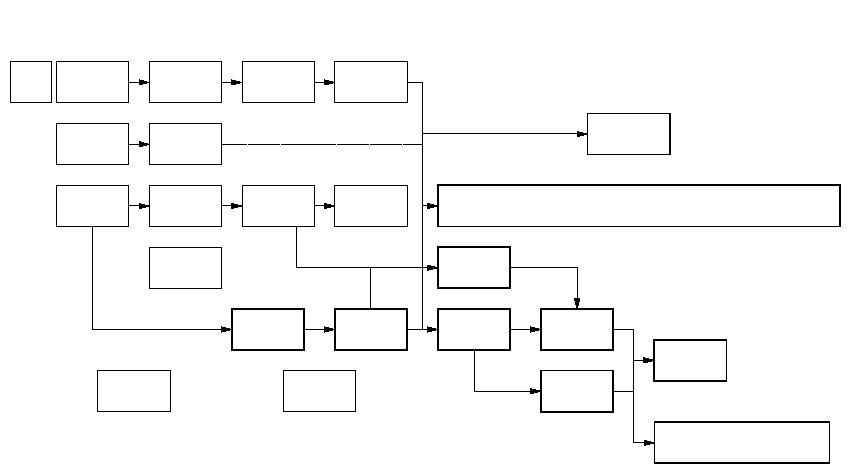
29
Look closely at the Undergraduate Handbooks and Independent Work Guides on the various
departmental websites, which you can find by following links to “undergraduate” and “handbook” or
“guide”. In particular, look at what students have done recently for independent work. Do any of
these topics intrigue you, even if you do not yet understand the technical jargon?
Approach faculty members. Each department has a faculty member called the “director of
undergraduate studies” who is the head adviser. They will have extended office hours or other
opportunities to talk with students interested in their department. You will meet the director of
undergraduate studies at the Open Houses in late March, and they will surely be willing to answer your
questions.
Major Maps
The diagrams below provide a schematic picture of the course sequence in each engineering
department. Information in each department’s undergraduate handbook or guide takes precedence
over these charts. Courses outlined in bold represent departmental core courses and technical
electives. Course schedule changes from one year to the next may cause variation in these maps, but
they provide a general idea of the key courses.
Chemical and Biological Engineering
(MAT
103)
PHY 103
MAT 104
Term 1
Term 2
Term 3
Term 4
Term 5
Term 6
Term 7
Term 8
CHM
201/207
CHM 202
PHY 104
MAT
201/203/216
MAT
202/204/217
MAE 305
CHM 301
CHM 302 or
other advanced
CHM course
COS 126
CBE 245
CBE 246
CBE 341
CBE 250
WRI either
term
MOL 214/5
either term
CBE 346
CBE 441
CBE 442
CBE 454 (senior thesis)
4-5 Program Electives, including at least two drawn from CBE, CEE,
COS, EGR, ELE, MAE, MSE
Advanced
CBE course
At least 7 humanities/social science electives covering
4 distribution areas, including one EM
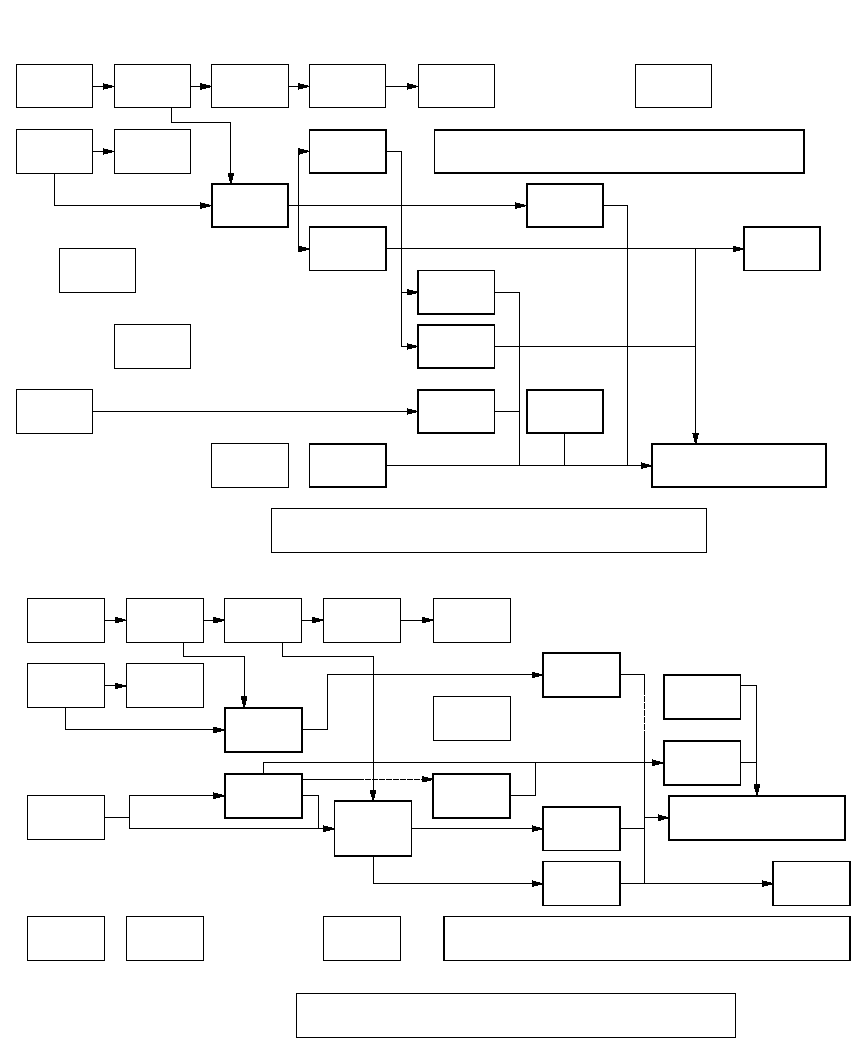
30
Civil and Environmental Engineering
Course sequences for the Structural and Environmental tracks in CEE are below. Architectural and
Geological tracks are similar; consult the departmental undergraduate guide. The Engineering and
Liberal Arts track permits a flexible program of study.
MAT 103
PHY 103
MAT 104
Term 1
Term 2
Term 3
Term 4
Term 5
Term 6
Term 7
Term 8
CHM
201/207
GEO 203
PHY 104
MAT
201/203/216
MAT
202/204/217
MAE 305
ORF 245
CEE 262A
COS 126
CEE 205
CEE 312
CEE 366
CEE361
WRI either
term
Structural
CEE 306
CEE 478 (two-term senior
thesis)
CEE365
3 or more Program Electives
CEE461
At least 7 humanities/social science electives covering 4 distribution areas,
including one EM
CEE 364
CEE 207
MAT 103
PHY 103
MAT 104
Environmental
CHM
201/207
GEO 203
PHY 104
MAT
201/203/216
MAT
202/204/217
MAE 305
ORF 245
CEE 305
COS 126
CEE 205
CEE 302 or
304
CEE 477
CEE 311
WRI either
term
CEE 308
CEE 306
CEE 478 (two-term senior
thesis)
CEE364
3 or more Program Electives
CEE 471
At least 7 humanities/social science electives covering 4 distribution areas,
including one EM
CEE 207
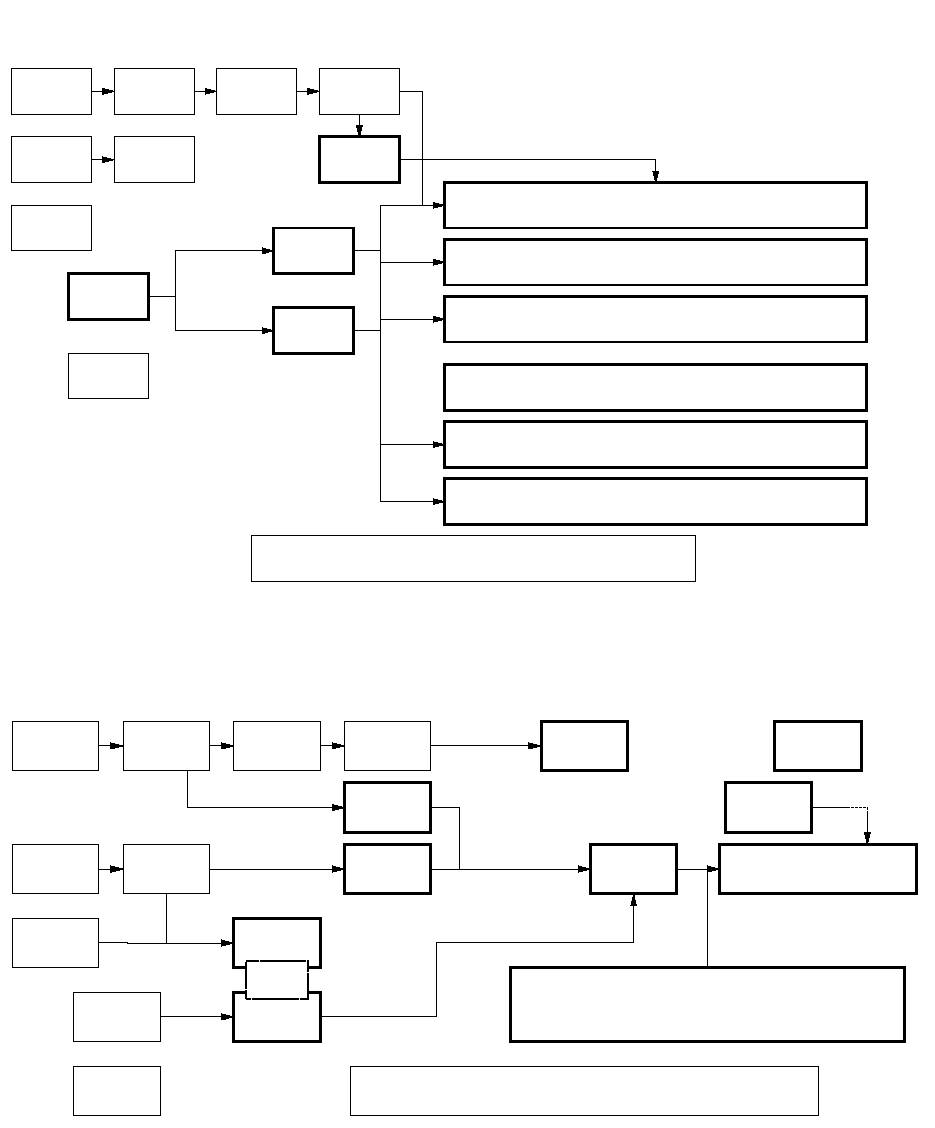
31
Computer Science BSE (effective beginning with the Class of 2025)
MAT 103
PHY 103
MAT 104
Term 1
Term 2
Term 3
Term 4
Term 5
Term 6
Term 7
Term 8
CHM
201/207
One or more semesters of independent work (COS 397/398/497/498)
PHY 104
MAT
201/203/216
MAT
202/204/217
COS 217
either term
COS 226
either term
One course in Theoretical CS: e.g. COS 423, 433, 445, or 487
COS 126
either term
One course in Computer Systems: e.g. COS 316 or 375
One course in AI or ML: e.g.COS 324 (alternatively 424, 429, or 484)
Three 300-level or above COS electives
COS 240
(term 3-6)
WRI either
term
One breadth course: e.g. COS 326, 333, 343, 426, 432, 436, 448
At least 7 humanities/social science electives covering 4 distribution areas
Electrical and Computer Engineering
MAT 103
PHY 103
MAT 104
Term 1
Term 2
Term 3
Term 4
Term 5
Term 6
Term 7
Term 8
CHM
201/207
ECE 201
PHY 104
MAT
201/203/216
MAT
202/204/217
ECE 203
ECE 308
COS 126/
ECE 115
ECE 206
ECE 302
upper level
math
ECE 497-498
two-term senior thesis
WRI either
term
Additional departmental courses to fulfill concentration, breadth,
and balance requirements at 300-level or higher; prerequisites
may include 201, 203, 206, and/or 308
non-ECE
eng. science
design
beyond 302
or
At least 7 humanities/social science electives covering 4 distribution areas
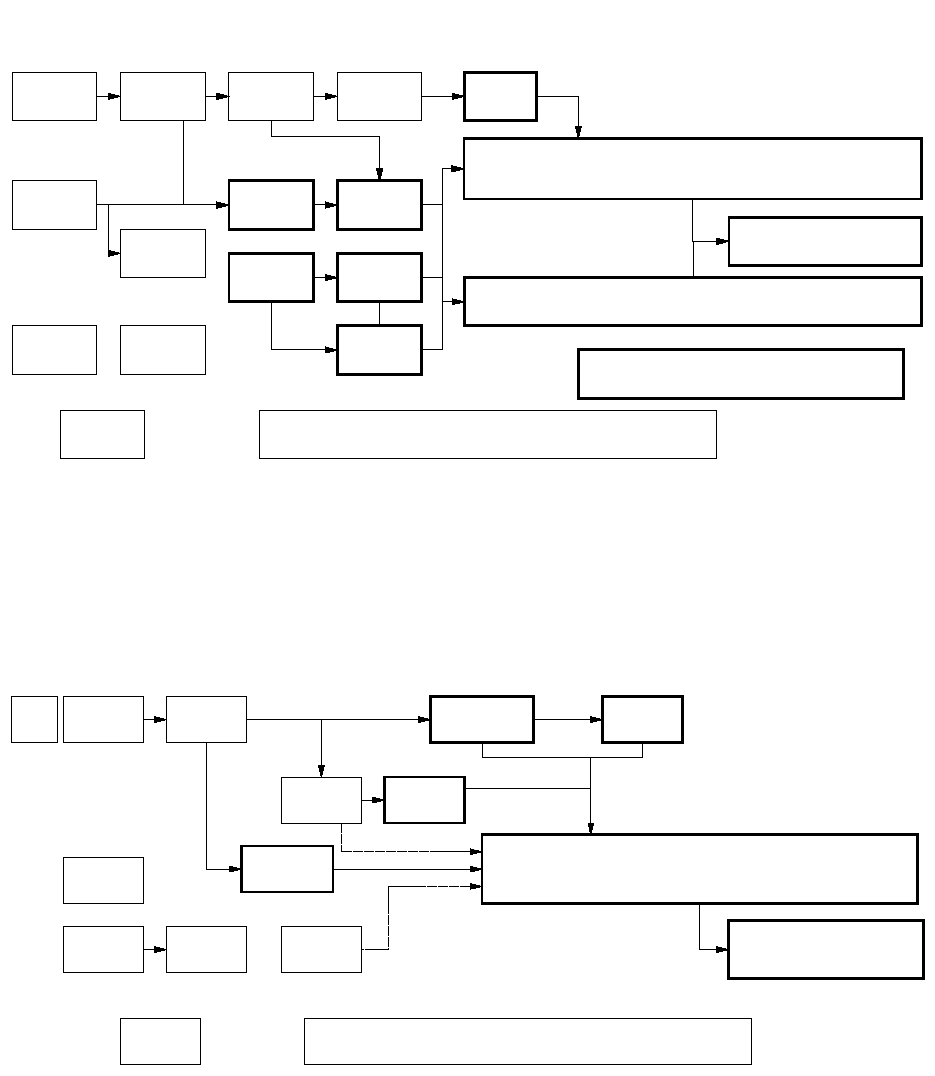
32
Mechanical and Aerospace Engineering
Students in MAE may choose to pursue either the Aerospace Engineering or Mechanical Engineering
tracks or they may pursue both. For detailed information, please consult the MAE undergraduate
handbook.
MAT 103
PHY 103
MAT 104
Term 1
Term 2
Term 3
Term 4
Term 5
Term 6
Term 7
Term 8
CHM
201/207
MAE 223
PHY 104
MAT
201/203/216
MAT
202/204/217
MAE 305
MAE 221
MAE 206
COS 126
MAE 222
MAE 224
three design courses appropriate to program
five engineering science courses in dynamics and control, fluid mechanics,
and materials and structures appropriate to program, and a math elective
WRI either
term
Independent work with design
(1 or 2 terms in senior year)
additional technical electives and independent work
as needed or desired
At least 7 humanities/social science electives covering 4 distribution areas
Operations Research and Financial Engineering
(MAT
103)
PHY 103
MAT 104
Term 1
Term 2
Term 3
Term 4
Term 5
Term 6
Term 7
Term 8
CHM
201/207
ORF 309 (term
3, 4 or 5)
PHY 104
MAT
201/203/216
MAT
202/204/217
ORF 307
Two-term senior thesis
(ORF 478 credited 2X in spring)
ORF 335
ORF 245
(term 2 or 3
10 departmental electives (or 11 if ORF 479 one-term IW chosen) including
at least four from ORFE and no more than three from any one other
department)
COS 126
WRI either
term
At least 7 humanities/social science electives covering 4 distribution areas
33
Certificate programs and interdisciplinary work
Many B.S.E. students find that certificate programs provide with opportunities to explore interests
outside their majors. Programs in Engineering Biology, Engineering Physics, and Applications of
Computing are very popular, and B.S.E. students are heavily represented in the Finance program.
Almost all non-engineering certificates are also open to B.S.E. students. You may find that even without
doing a certificate program you will have opportunities to take courses outside your major for breadth in
another engineering field. Finally, it may be possible to do independent work that spans different
departments and for it to be advised jointly by faculty members from each one. For example, Electrical
and Computer Engineering majors have done independent work with faculty in Neuroscience.
Changing majors
Some students have second thoughts over the summer and decide that they prefer to major in a
different engineering department. At the start of the fall term, changing is simple. It involves getting a
form from the Undergraduate Affairs Office (Ms. Traci Miller) and following the steps on it. As
sophomore year goes on, it is more difficult, and some changes are easier than others (e.g. from ORFE to
COS), but it is often possible to work out changes by the beginning of the spring term of sophomore year
or even later.
Planning for Studying Abroad
The spring of your first year is a good time to start planning for studying abroad. The usual time to
study abroad is the spring of junior year (except for CBE, when it’s spring of sophomore year, and ECE,
when fall of junior year is best.) Early planning is key. First, think about where you might want to study.
Princeton has exchanges with several top engineering programs abroad, but more destinations are
available outside exchanges. Visit the Study Abroad Program in the Simpson International Building and
look at student reviews of destinations. Attend information sessions on Study Abroad for B.S.E.
students that take place every semester, as well as information sessions on specific programs
Dean Bogucki is always happy to discuss studying abroad and how it works with different majors.
Please go away!
34
8. Useful Contacts
SEAS Directors of Undergraduate Studies
If you have specific questions about a department, don’t hesitate to contact the appropriate director of
undergraduate studies. For 2022-23, the directors of undergraduate studies are:
Chemical and Biological Engineering
Prof. José Avalos 9881 101 Hoyt [email protected]
Civil and Environmental Engineering
Prof. Branko Glišić
8278 E330A E-Quad bglisic@princeton.edu
Computer Science
Prof. Brian Kernighan 2089 311 CS Building bwk@cs.princeton.edu
(Prof. Kernighan is the departmental rep for COS pre-majors, non-majors, and study abroad.)
Electrical and Computer Engineering
Prof. Prateek Mittal 0814 B326 E-Quad pmittal@princeton.edu
Mechanical and Aerospace Engineering
Prof. Michael Littman 5198 D202A E-Quad [email protected]du
Operations Research and Financial Engineering
Prof. Robert Vanderbei 2345 209 Sherrerd rvdb@princeton.edu
Certificate Program Directors
Besides the six SEAS departments, there are a number of interdisciplinary certificate programs which
may be of interest to B.S.E. students. Students who complete the program requirements are formally
recognized with certificates at graduation and with a notation on their transcript. Advisees with
questions about these programs are best referred to the program directors listed below.
Applications of Computing
Prof. J.P. Singh 5329 324 350 Olden St. jps@princeton.edu
Applied and Computational Mathematics
Prof. Ramon van Handel 0973 207 Fine rvan@princeton.edu
Architecture and Engineering
Prof. Maria Garlock 2728 E307 E-Quad mgarlock@princeton.edu
35
Engineering Biology
Prof. Celeste Nelson 8851 303 Hoyt celesten@princeton.edu
Engineering Physics
Prof. Stephen Lyon 4635 B428 E-Quad lyon@princeton.edu
Geological Engineering
Prof. Catherine Peters 5645 E417A E-Quad cap@princeton.edu
Materials Science & Engineering
Prof. Alejandro Rodriguez 8962 B318 E-Quad arod@princeton.edu
Optimization and Quantitative Decision Science
Robotics and Intelligent Systems
Prof. Szymon Rusinkiewicz 7479 222 Computer Sciece smr@princeton.edu
Statistics and Machine Learning
Prof. Ryan Adams
8682 411 Computer Science rpa@princeton.edu
Sustainable Energy
Prof. Yiguang Ju 5644 D330 E-Quad yju@princeton.edu
Technology and Society
Interested students should first consult:
Dr. Victoria Dorman 8676 ACE-24 E-Quad vdorman@princeton.edu
Also of interest to B.S.E. students:
Environmental Studies
Contact Ms. Amber Lee 4998 127 Guyot amberlee@princeton.edu
Language and Culture
Consult director of undergraduate studies in appropriate language department
Teacher Preparation
Dr. Todd Kent 3336 41 William Street twkent@princeton.edu

36
Other Important Offices and People
SEAS Undergraduate Affairs Office
Dean Peter Bogucki C-207, E-Quad 4554 bogucki@princeton.edu
Ms. Traci Miller C-209, E-Quad 4554 [email protected]
The SEAS Undergraduate Affairs Office is your main point of contact for all your matters regarding the
undergraduate program of study in engineering. Send general questions to
BSEprogram@princeton.edu
.
Residential Colleges
BUTLER COLLEGE:
Dean: Dr. Rashidah Andrews 4954 rashidah@princeton.edu
Assistant Dean: Dr. Matthew Lazen 7140 mlazen@princeton.edu
FORBES COLLEGE:
Dean: Dr. Patrick Caddeau 5229 caddeau@princeton.edu
Assistant Dean: Dr. Fang Du 7193 @princeton.edu
MATHEY COLLEGE:
Dean: Dr. Michael Olin 3317 molin@princeton.edu
Assistant Dean: Dr. Natalia Córdova-Sánchez 7223 ncordova@princeton.edu
NEW COLLEGE WEST:
Dean: Dr. Anne Caswell-Klein 6496 [email protected]
Assistant Dean: Dr. Johanna Rossi Wagner 1929 jrwagner@princeton.edu
ROCKEFELLER COLLEGE:
Dean: Dr. Justine Levine 7245 justinel@princeton.edu
Assistant Dean: Dr. Maria Medvedeva 3728 masha@princeton.edu
WHITMAN COLLEGE
Dean: Dr. Jaclyn Schwalm 8525 jschwalm@princeton.edu
Assistant Dean Dr. Matthew Newman 8093 8525
YEH COLLEGE
Dean: Dr. Alexis Andres 2248 aandres@princeton.edu
Assistant Dean Dr. Junhow Wei
Placement Officers
Chemistry Dr. Rob L’Esperance 1307 A87 Frick rpl@princeton.edu

37
Computer Science Dr. Christopher Moretti 5388 036 Corwin cmoretti@princeton.edu
Mathematics Dr. Ana Menezes 4230 510 Fine Hall amenezes@Princeton.edu
Physics Dr. Katerina Visnjic 2313 219 Jadwin visnjic@princeton.edu
Other Important People and Offices
Academic-Athletic Advising
Dean Alec Dun 9310 408 Morrison jamesdun@princeton.edu
Health Professions Advising
Ms. Kate Fukawa-Connelly 0900 233 36 Univ. Pl. hpa@princeton.edu
Study Abroad Program
Dr. Gisella Gisolo 1010 A55A Simpson ggisolo@princeton.edu
Counseling and Psychological Services (CPS)
McCosh Health Center 3141 McCosh Health Center, 3
rd
floor
Princeton Writing Program
Dr. Amanda Irwin Wilkins 2703 205 New South [email protected]
writing@princeton.edu
Director of Davis International Center for international student matters
Mr. Albert Rivera 9403 A53 Simpson Bldg intlctr@princeton.edu
Associate Director of career advising for engineering students
Ms. Pamela Cohen 1090 213 36 Univ. Place pamela.cohen@princeton.edu

38
9. How do I …?
In this section, many of the most common questions asked by first-year B.S.E. students are answered.
… choose my courses?
After becoming familiar with the requirements for your program of study from all the information you
have received (including this Guide) you should go online through TigerHub and prepare your Academic
Planning Form. Then meet with your adviser, who will approve your course selections.
… change a course?
Dropping and adding a course is done through TigerHub after consultation with your adviser during the
first two weeks of classes. After that, you may drop a fifth course (for a fee) until the end of the ninth
week of classes. You normally can’t add a course after the second week of classes. Dropping a fourth
course should be done only for extreme damage control and must be discussed with Dean Bogucki.
… get an extension?
See your residential college assistant dean before Dean’s Date. Extensions are given only for work that
is due on Dean’s Date, not work that should have been completed earlier in the semester.
… study abroad?
Start planning early. Attend the Study Abroad for B.S.E. Students information sessions offered at the
start of the Fall and Spring terms. Determine which term works best for your intended major and
possible destinations. Visit the Study Abroad office in the Simpson Building and meet with the
counselor responsible for the place you want to go. Read reviews by students who have been abroad.
Dean Bogucki is always happy to talk about studying abroad. Eventually, you need approval for your
program of study from your department as part of the application process. A 3.0 GPA in the academic
year prior to departure is required for studying abroad.
… choose my major?
During your first year in the B.S.E. program, you will familiarize yourself with the six engineering
departments by attending the Explore Engineering majors fair in the fall, all sorts of departmental
programs, visiting the departments’ websites and looking at their undergraduate handbooks, and
eventually attending the Departmental Open Houses in spring. You will then meet with a faculty
adviser in your intended department (not your first-year adviser) and choose courses for the fall.
… declare my major?
In late April, you will receive an e-mail from the Registrar asking you to confirm your choice of major by
selecting it from a drop-down menu.
… change my major (sophomores, within B.S.E.)?
Inform yourself about the program in your new intended major by reading the undergraduate guide at
the department’s website. Note requirements you have missed and devise a plan to make up. Pick up
a sophomore-change-of-department from the SEAS Undergraduate Affairs Office, C-209 Engineering
Quad. Follow the steps on the form and meet with the director of undergraduate studies of your old

39
and new department. Return the form to us and the change will be made with the Registrar and your
college.
… change my degree (B.S.E. to A.B., A.B. to B.S.E.)?
You need to see Dean Bogucki for a conversation. If you wish to switch to B.S.E., discuss how you plan
to fulfill the general engineering requirements. If you wish to switch to AB, have a good reason.
… find my adviser?
Ideally you remember your adviser’s last name, and you can go to the Princeton University Homepage
and search on it. Along with contact information, your adviser’s office address will be listed. If you are
lost, please stop at the Undergraduate Affairs Office in C-209 E-Quad and we will direct you.
… find my interactor???
You can also find contact information for your interactor by searching the Princeton directory on the
homepage. If in doubt, please contact the Undergraduate Affairs Office, and we will direct you.
… change sections within a course?
Normally, this should be something that you can handle within the course itself. Large courses will
have a teaching assistant who serves as course administrator and that is the person with whom to
speak. In Math, you will have to visit the Math Undergraduate Office in Fine Hall to arrange to switch
sections. If in doubt, ask the instructor.
… change a course to PDF?
Check Course Offerings whether the course is allowed to be taken PDF. You can make a change in
TigerHub between the beginning of the seventh week and the end of the ninth week of classes. B.S.E.
students may take up to four courses out of the 36 on a PDF basis. Only one course can be elected PDF
in any given term. Courses that are offered PDF-only do not count against these limits. Remember that
B.S.E. general math-physics-chemistry-computing requirements may not be taken on a PDF basis.
… find out about certificate programs?
All certificates have websites. Here is a good link: https://odoc.princeton.edu/curriculum/certificates.
Choosing a major takes priority over certificates. Don’t worry too much about certificates right now.
… get premed advice?
Get your premed advice exclusively from the Health Professions Advising Office, 36 University Place,
Suite 230. Contact them at [email protected] or visit https://hpa.princeton.edu/
.
… get career advice?
It’s not too early to become familiar with the Center for Career Development. Visit their website at
https://careerdevelopment.princeton.edu/
. Make an appointment for individual career advising with
Ms. Pam Cohen by visiting https://princeton.joinhandshake.com. Attend the Science and Technology
Job Fair in October.

40
… take Advanced Standing?
Make sure you’re eligible. For a year of Advanced Standing, you need 8 units of AP credit, including 2
in physics, placement out of Math 103-104, and 1 in chemistry. For a semester of Advanced Sanding,
you need 4 units of AP credit, including 2 in physics, 1 in math, and 1 in chemistry. If you don’t have
AP in physics, math, or chemistry, you’re not eligible as a B.S.E. student. If you are interested in a full
year of Advanced Standing, then you need to take a sophomore program of study from the beginning.
See Chapter 7 above for the right 200-level departmental courses. In November, a letter from your
assistant dean will inform you of eligibility. Discuss with your advisers, Dean Bogucki, and your
assistant dean whether Advanced Standing is for you. If you’re not interested, you don’t have to do
anything. If you are, an application originates with your assistant dean. If you take Advanced
Standing and find things are moving too fast, you can revert to your original class.
… take a summer course?
B.S.E. students may take up to four pre-approved summer courses at other four-year accredited
institutions. See
https://engineering.princeton.edu/undergraduate-studies/sophomore-senior-
advising/summer-course-information for information on current policies and procedures. The
deadline for preapproval is Dean’s Date of the spring term.
… find a summer job?
Start early, by December or January. All experience is useful. Earning money is good. Are there family
members or friends who can employ you? Talk with faculty members about summer research. Watch
e-mail from Dean Bogucki. Explore the National Science Foundation’s Research Experiences for
Undergraduates (REU) program. Attend the Science and Technology Job Fair and events run by Career
Development. Search the HandShake system (
https://careerdevelopment.princeton.edu/internships-
jobs/handshake). Investigate the International Internship Program. Be alert and resourceful!
… take a leave of absence (not a gap year!)?
If you want to take a break in your Princeton education and you are in good academic standing, that’s
known as “taking a leave of absence.” A “gap year” is between high school and college. Please don’t
say “I want to take a gap year.” You should discuss your reasons and plans for taking a leave of absence
with your college dean. Have a plan for what you’ll do while you’re away to make the most of the
opportunity. When you return, you usually pick up where you left off. For example, if you take a leave
of absence after finishing the fall term, then you’ll come back for the next available spring term.
… get academic help?
Talk with your instructor. Go to office hours! If you did poorly on a test, bring it to discuss. If office
hours seem intimidating, go with a friend in the course. If the course has teaching assistants, meet with
them, too. Look into services offered by the McGraw Center for Teaching and Learning like study halls
(group tutoring) and learning consultations to get more from your courses. The Writing Center offers
help with papers. Talk with your assistant dean about whether individual tutoring is appropriate. But
always start with the course instructors!

41
… find my instructors' office hours?
These should be listed on the syllabus or on the instructors’ own websites. Posted office hours are not
the only times an instructor is available. If you have a conflict with the scheduled office hours, speak
with the instructor after class and usually another time to meet can be easily found.
… drop a course?
Why? Discuss with your adviser. Are you having difficulty? What have you done to succeed in the
course? Talk with your instructor. Often you’ll find you’re doing better than you thought. Is it a
course you need for your degree (e.g. Physics 103)? In that case, see Dean Bogucki. If it’s a fifth
course, and you don’t need it to stay on track for the B.S.E. degree, then you can drop it in TigerHub. If
it’s a fourth course, that’s a problem. See Dean Bogucki.
… get a transcript?
Your transcript is the official documentation of your Princeton academic record. You can request your
official transcript from the Registrar at https://registrar.princeton.edu/student-and-alumni-services
.
… obtain accommodation for a disability?
See the Office of Disability Services after reviewing their website: https://ods.princeton.edu/ .
… change my name or home address?
See if you can do it in TigerHub (https://registrar.princeton.edu/tigerhub ) or visit the Registrar’s Office.
… review my Degree Progress?
“Degree Progress” in TigerHub enables you to see how you are fulfilling requirements toward
graduation. You’re responsible for making sure you’re on track. Check your degree progress every
semester and after you change courses. Notify Dean Bogucki if anything isn’t calculating correctly.
… get verification of enrollment?
You may need a document verifying your enrollment at Princeton for a job or scholarship application.
The Registrar’s Office provides verification of enrollment free of charge. Visit
https://registrar.princeton.edu/student-and-alumni-services
, click on “Transcript and enrollment
verification”.
…get a letter of recommendation?
Do you know a Princeton faculty member or administrator? They are often asked to write
recommendations and with advance notice, they usually do not mind doing it. Tell them what you’re
applying for and why it interests you. Provide the name and address to whom they should write. You
know at least one Princeton faculty member: your academic adviser. So get to know your adviser!
… find Dean Bogucki?
Dean Bogucki’s office is in room C-207 of the Engineering Quad, next to the E-Quad Café.
… find Traci Miller?
Ms. Miller’s office is right next to Dean Bogucki’s, C-209 of the Engineering Quad.

42
… see Dean Bogucki?
Please send Traci Miller e-mail at BSEprogram@princeton.edu to make an appointment. Please don’t
e-mail Dean Bogucki directly to ask when is a good time, since he will just forward your e-mail to Ms.
Miller to make an appointment.
… say Dean Bogucki's name?
Dean Bogucki’s grandparents were born in Poland, and he uses the Polish pronunciation of his name.
Try saying Bow-good-ski (accent on the good) or if you want to get a little closer to the right sound, you
can try Boh-goot-zki. Pro-tip: “Bogucki” does not rhyme with “Kentucky”!
If your question is not answered here, please contact the SEAS Undergraduate Affairs Office at
BSEprogram@princeton.edu
. Dean Bogucki or Traci Miller have years of experience at Princeton and
can direct you to the proper person or office.
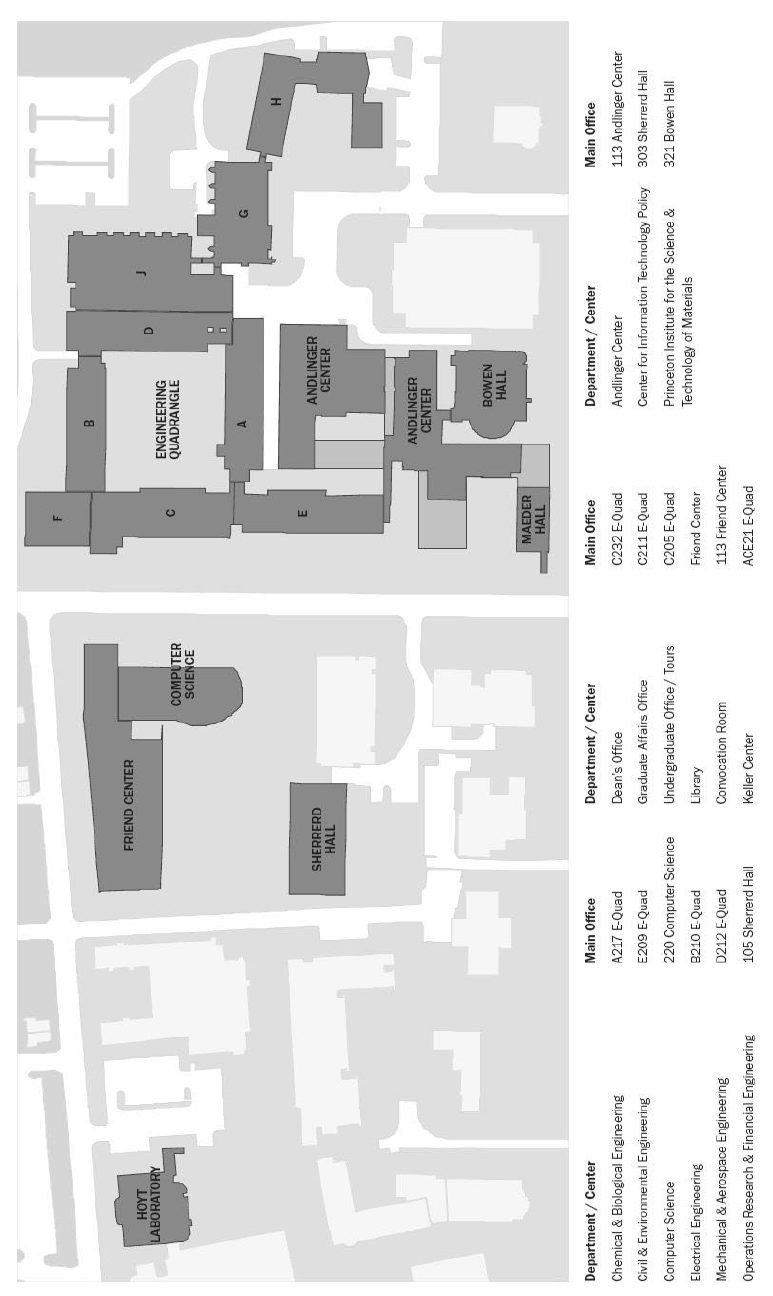
43
44
